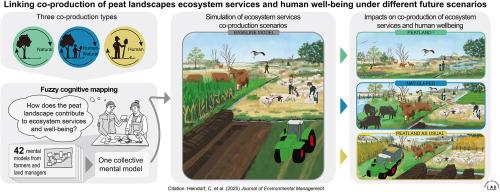Linking co-production of peat landscapes ecosystem services and human well-being under different future scenarios: A fuzzy cognitive mapping approach
IF 8.4
2区 环境科学与生态学
Q1 ENVIRONMENTAL SCIENCES
引用次数: 0
Abstract
Degraded peatlands in Germany are undergoing significant transformations, requiring effective intervention strategies for society, climate, and nature. In this study, we assessed and modelled the co-production of ecosystem services (ES) within a peatland landscape in Northern Germany and their perceived impact on human well-being. We applied a mixed qualitative and quantitative approach based on fuzzy cognitive mapping. Farmers and land managers were invited to create mental models of the peatland system, which were then analysed and used to simulate three contrasting co-production scenarios, each reflecting different degrees of human influence on the landscape. Results underscore the vital role of natural and human-natural co-production, with regulating and supporting ES perceived as crucial. Fuzzy cognitive mapping reveals that peat landscapes extend beyond their climate mitigation and conservation value, highlighting their multifunctional character. Different land uses contribute to the co-production of cultural ES and well-being components, especially by providing basic material well-being. Simulation of intervention scenarios reveals distinct synergies and trade-offs in ES co-production and well-being. In the perception of our respondents, climate-sensitive management achieves similar ES co-production and well-being benefits as strict conservation and significantly outperforms peat-degrading intensive management. While large-scale peatland transformation is inevitable, we recommend focusing on integrated land management strategies that promote synergies and human-natural co-production of ES. Addressing global challenges like the climate crisis and biodiversity loss, while promoting cultural ES and well-being, requires a mosaic of managed areas, conserved peatlands, and less intensive use. Our findings aim to stimulate discussions on the transformative potential and stakeholder involvement in sustainable peatland management and restoration.

未来不同情景下泥炭景观生态系统服务与人类福祉的联系:一种模糊认知映射方法
德国退化的泥炭地正在经历重大转变,需要有效的社会、气候和自然干预策略。在这项研究中,我们评估并模拟了德国北部泥炭地景观中生态系统服务(ES)的共同生产及其对人类福祉的感知影响。我们采用了基于模糊认知映射的混合定性和定量方法。农民和土地管理者被邀请创建泥炭地系统的心智模型,然后对这些模型进行分析,并用于模拟三种不同的联合生产情景,每种情景都反映了人类对景观的不同程度的影响。结果强调了自然和人-自然共同生产的重要作用,调节和支持生态系统被认为是至关重要的。模糊认知映射揭示了泥炭景观超越了其气候缓解和保护价值,突出了其多功能特征。不同的土地利用有助于文化ES和福祉组成部分的共同生产,特别是通过提供基本的物质福祉。干预情景的模拟揭示了ES联合生产和福祉方面明显的协同效应和权衡。在我们的受访者看来,气候敏感型管理实现了与严格保护相似的ES联合生产和福祉效益,并且明显优于泥炭退化的集约化管理。虽然大规模的泥炭地改造是不可避免的,但我们建议将重点放在综合土地管理战略上,以促进协同效应和人类与自然共同生产生态系统。应对气候危机和生物多样性丧失等全球挑战,同时促进文化环境和福祉,需要综合管理地区、保护泥炭地和减少集约利用。我们的研究结果旨在激发对可持续泥炭地管理和恢复的变革潜力和利益相关者参与的讨论。
本文章由计算机程序翻译,如有差异,请以英文原文为准。
求助全文
约1分钟内获得全文
求助全文
来源期刊

Journal of Environmental Management
环境科学-环境科学
CiteScore
13.70
自引率
5.70%
发文量
2477
审稿时长
84 days
期刊介绍:
The Journal of Environmental Management is a journal for the publication of peer reviewed, original research for all aspects of management and the managed use of the environment, both natural and man-made.Critical review articles are also welcome; submission of these is strongly encouraged.
 求助内容:
求助内容: 应助结果提醒方式:
应助结果提醒方式:


